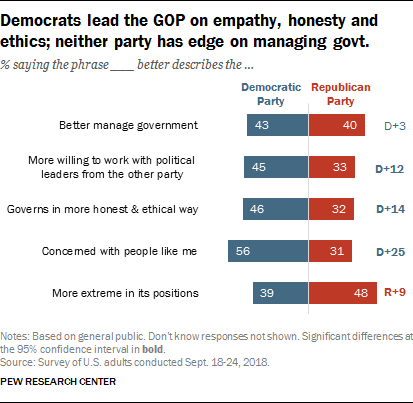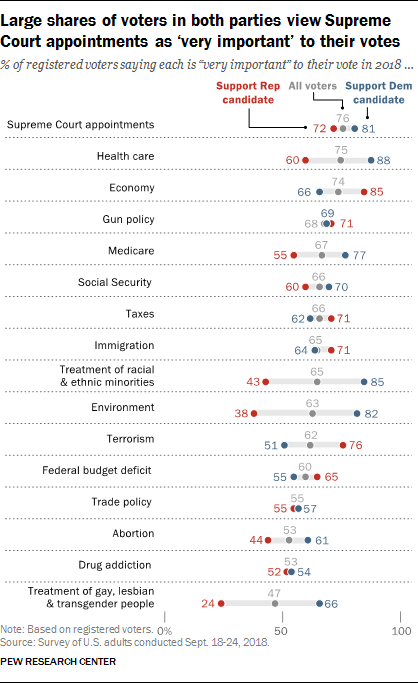
In the past, the Democratic Party has often held advantages on these traits, but in January 2017, shortly before Trump’s inauguration, the GOP ran nearly even with the Democrats on honesty and ethics and concern for “people like me.”
As in the past, neither party has an edge on better managing the government (43% say the Democratic Party, 40% the Republican Party). More people continue to regard the Republican than the Democratic Party as “more extreme in its positions” (48% Republican Party, 39% Democratic Party).
In terms of issues, the Democratic Party continues to hold a wide advantage over the Republican Party on dealing with health care (51% to 35%) and modest leads on foreign policy and immigration. While the two parties run about even on dealing with the economy (41% Democratic Party, 40% Republican Party), that represents a change since June, when the GOP held a significant, 9-point edge on handling the economy.
Top issues for voters: Supreme Court, health care, economy
The survey, conducted amid allegations of sexual misconduct by Brett Kavanaugh, Trump’s nominee for the Supreme Court, finds that large majorities of voters in both parties view Supreme Court appointments as a “very important” voting issue.

Overall, 76% of registered voters – including 81% who support the Democratic candidate and 72% who favor the Republican candidate – say appointments to the court will be very important to their vote this fall.
Among all voters, Supreme Court appointments rank with health care (75%) and the economy (74%) among the top voting issues.
While health care and the economy typically rank among the top issues for voters, there is no trend to past midterms on the importance of court appointments.
However, more voters view Supreme Court appointments as a very important issue today than did so in June 2016, during the presidential election. At that time, 65% of voters (70% of Republicans and 62% of Democrats) said court appointments were very important.
There are sizable partisan gaps over the importance of a number issues. As in the past, Democratic voters (82%) are far more likely than Republicans (38%) to say the environment will be very important.
The gap is about as large over the importance of the treatment of racial and ethnic minorities and the treatment of gay, lesbian and transgender people. Democratic voters are about twice as likely as Republican voters to consider the treatment of racial and ethnic minorities as a very important voting issue (85% vs. 43%). And while two-thirds of Democrats (66%) view the treatment of gay, lesbian and transgender people as very important, just 24% of Republicans do so – the lowest share of Republicans citing any of the 16 issues as very important.
Democrats also are more likely than Republicans to view health care, Medicare and abortion as very important voting issues. More Republicans than Democrats rate the economy, terrorism, the federal budget deficit and taxes as very important.
Comparable shares of voters in both parties rate several issues as very important. For example, 71% of voters who favor the Republican candidate in their district and 69% who support the Democrat say gun policy will be very important. There also are not significant partisan differences on the importance of drug addiction and trade policy.
More Articles
- Board of Governors of the Federal Reserve System: Something’s Got to Give by Governor Christopher J. Waller
- Selective Exposure and Partisan Echo Chambers in Television News Consumption: Innovative Use of Data Yields Unprecedented Insights
- February’s Hot Data Releases: Governor Christopher J. Waller, Federal Reserve Board Frames a Few of the Issues Around Inflation and the Economic Outlook
- Remarks by President Biden on American Rescue Plan Investments; September 02, 2022, South Court Auditorium Eisenhower Executive Office Building
- Attorney General Merrick B. Garland Statement on Supreme Court Ruling in Dobbs v. Jackson Women’s Health Organization
- The US Housing and Mortgage Market, Risks and Resilience: Federal Reserve Governor Michelle W. Bowman
- Jo Freeman Reviews: Justice, Justice Thou Shalt Pursue: A Life’s Work Fighting for a More Perfect Union By Ruth Bader Ginsburg and Amanda Tyler
- Federal Reserve Chairman Jerome Powell: Monetary Policy in the Time of Covid
- What Do You Know About the Problem Solvers Caucus in the House of Representatives? They Unveiled New Bipartisan Solutions to Rebuild America’s Infrastructure, Among Other Concerns
- Jo Freeman: The Georgia Peach Is Purple






